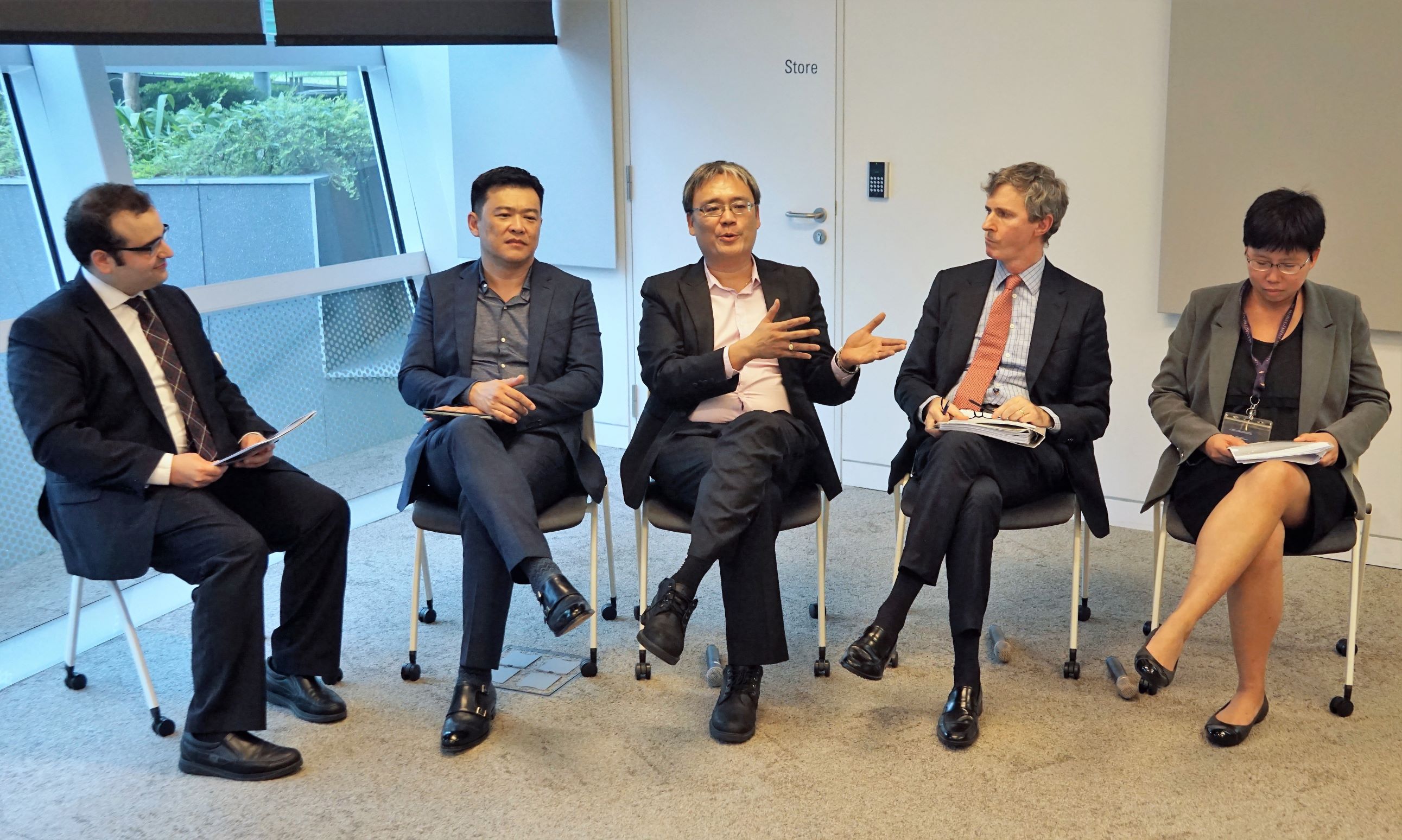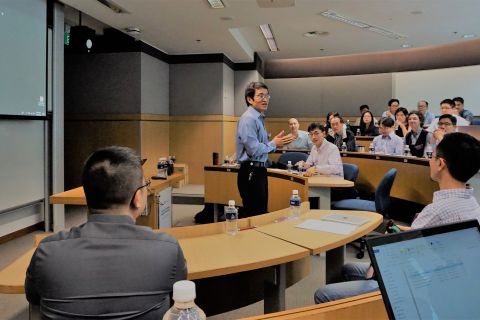
Above (from left): Moderator – Assistant Professor Aurelio Gurrea-Martínez from SMU School of Law, Panellists – Mr Lee Eng Beng of Rajah & Tann Singapore LLP; Mr Andrew Chan of Allen & Gledhill LLP; Associate Professor Stephen Bull from SMU School of Law; and Professor Wan Wai Yee from SMU School of Law.
By Jeremy Chan
SMU Office of Research & Tech Transfer – Amidst uncertainties in the global economy – whether they be caused by international tensions or digital disruption – companies may suddenly find themselves facing financial hardship. Should debt exceed income for extended periods of time, the likelihood of defaulting on payments to creditors rises, and the shadow of insolvency looms large.
Indeed, corporate defaults have become increasingly commonplace since the 2008 financial crisis, and law firms in the region have observed an uptick in cases involving companies seeking to restructure corporate debt. Different countries have different insolvency laws governing corporate debt restructuring, but executed properly, such legal proceedings can help a company get back on its feet and preserve stakeholder value.
At the Singapore Management University (SMU)-Cambridge roundtable on corporate insolvency law held on 5 April 2019 at the SMU School of Law, experts discussed how Singapore is modernising its insolvency law and positioning itself to become an international hub for debt restructuring. Moderated by SMU Assistant Professor Aurelio Gurrea-Martínez, the panel consisted of Professor Wan Wai Yee and Associate Professor Stephen Bull from SMU School of Law; Mr Lee Eng Beng of Rajah & Tann Singapore LLP; and Mr Andrew Chan of Allen & Gledhill LLP.
One Bill to rule them all
The seed of corporate insolvency law reform was planted nearly a decade ago, in 2010, when the Insolvency Law Review Committee (ILRC) was appointed to review existing laws and propose ways to strengthen Singapore’s legal framework pertaining to insolvency.
“Singapore’s laws, as far as bankruptcy is concerned, have been around since the mid-1990s. In terms of corporate insolvency, the real origin of those laws dates back to the 1800s,” said Mr Chan, adding that Singapore, having been a British colony, naturally inherited the British legal framework.
Over the years, however, several “patches” have been applied to insolvency law, where certain features deemed to be desirable for corporate debt restructuring have been imported from various other jurisdictions. This meant that insolvency practitioners would often have to cross-reference various pieces of legislation when dealing with corporate insolvency. “So in one sense, the laws were a bit all over the place,” Mr Chan quipped.
Hence, the ILRC proposed a consolidation effort, manifesting as the Insolvency, Restructuring and Dissolution Bill, otherwise known as the ‘Omnibus Bill’, passed by the Parliament of Singapore on 1 October 2018. The Bill aims to grant insolvency practitioners greater clarity and consistency when assisting distressed companies. It also provides insolvency practitioners with a wider range of tools to help companies resolve debt issues.
Expanding the restructuring toolkit
“Give us the tools and we will finish the job,” said Sir Winston Churchill in a speech on 9 February 1941, appealing to the then US administration to release military assistance to Britain during World War II. Analogously, the Omnibus Bill contains several provisions that could help rescue companies facing the prospect of insolvency.
“I think the showpiece of the recent reforms is the scheme of arrangement (SOA),” said Mr Lee, referring to a legally-binding agreement between a company and its creditors to help the company fulfil its debt obligations. He added that the inclusion of an automatic moratorium – a court-ordered stay on repayments to creditors – during insolvency proceedings would enhance the utility of SOA as a restructuring tool.
In implementing an automatic moratorium, Professor Bull noted that Singapore was taking a leaf from Australia’s insolvency playbook, and he agreed with Mr Lee that this was a positive development. “I don't think it’s a fundamental change in the philosophy [of our insolvency laws], but it is a refinement of our debt restructuring tools to make them fit for purpose for our local companies and for multinational corporations,” he said.
Another key feature of the Bill is the prohibition against ipso facto clauses in commercial contracts, Mr Lee highlighted. This provision restricts any party from unilaterally terminating or modifying the terms of a contract in response to the commencement of a restructuring procedure, in essence offering greater protection to debtors, since creditors cannot simply ‘abandon a sinking ship’.
Coupled with new provisions for rescue financing, the Omnibus Bill could be seen as a lifebuoy for companies in financial distress, granting them the opportunity to claw their way back to profitability.
An experiment in real time
With these updates to its insolvency laws, Singapore hopes to become an international hub for corporate debt restructuring. Counter-intuitive as it may seem, attracting debt can be a good business proposition. Mr Chan cited the example of a case his law firm handled, wherein an aircraft parts supplier operating in five jurisdictions performed its restructuring under Singapore’s insolvency laws and eventually turned its fortunes around.
“We brought in US$700 million worth of aircraft parts to Singapore and this became the base from which [the company] began to sell. In other words, insolvency brings work for the insolvency practitioners potentially, but in appropriate cases, even brings in solid businesses,” he said.
Nonetheless, changes to legislation are only the first step towards creating a robust ecosystem for corporate debt restructuring. The judiciary in Singapore also needs to get up to speed, the speakers noted.
“In addition to legislative reforms, the judiciary is moving towards more specialist structures that hear insolvency cases,” said Professor Wan. “This will lead to greater consistency in dealing with issues such as how long do you extend [a moratorium] and what needs to be taken into account [when granting an extension]. All these cannot be captured in the legislation and it requires judicial development.”
Summing up the discussion, Mr Lee emphasised that it will take time for the full ramifications of the Omnibus Bill to play out, urging patience and a willingness to adapt on the part of insolvency practitioners. “It’s an experiment that we have put out there, and it is too early to say if it is successful, but I am cautiously optimistic,” he concluded.
Back to Research@SMU May 2019 Issue
See More News
Want to see more of SMU Research?
Sign up for Research@SMU e-newslettter to know more about our research and research-related events!
If you would like to remove yourself from all our mailing list, please visit https://eservices.smu.edu.sg/internet/DNC/Default.aspx

